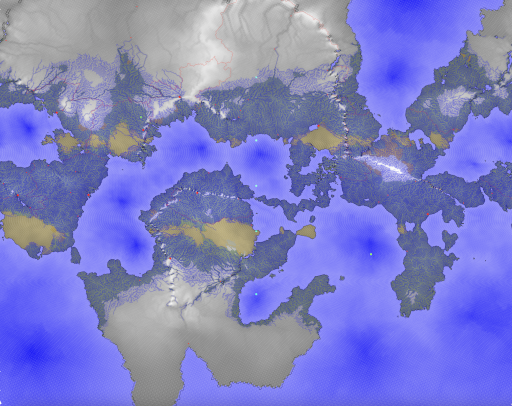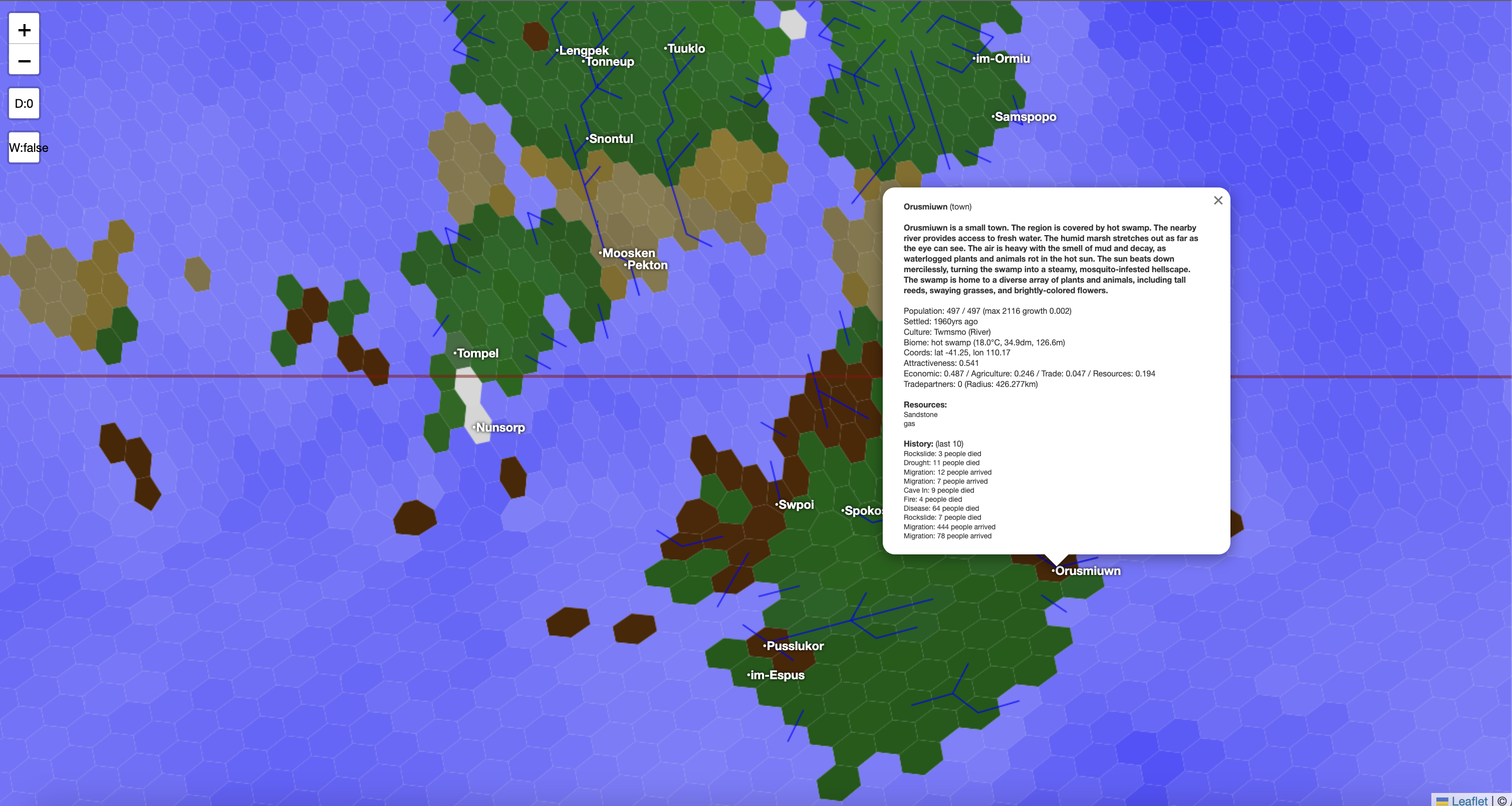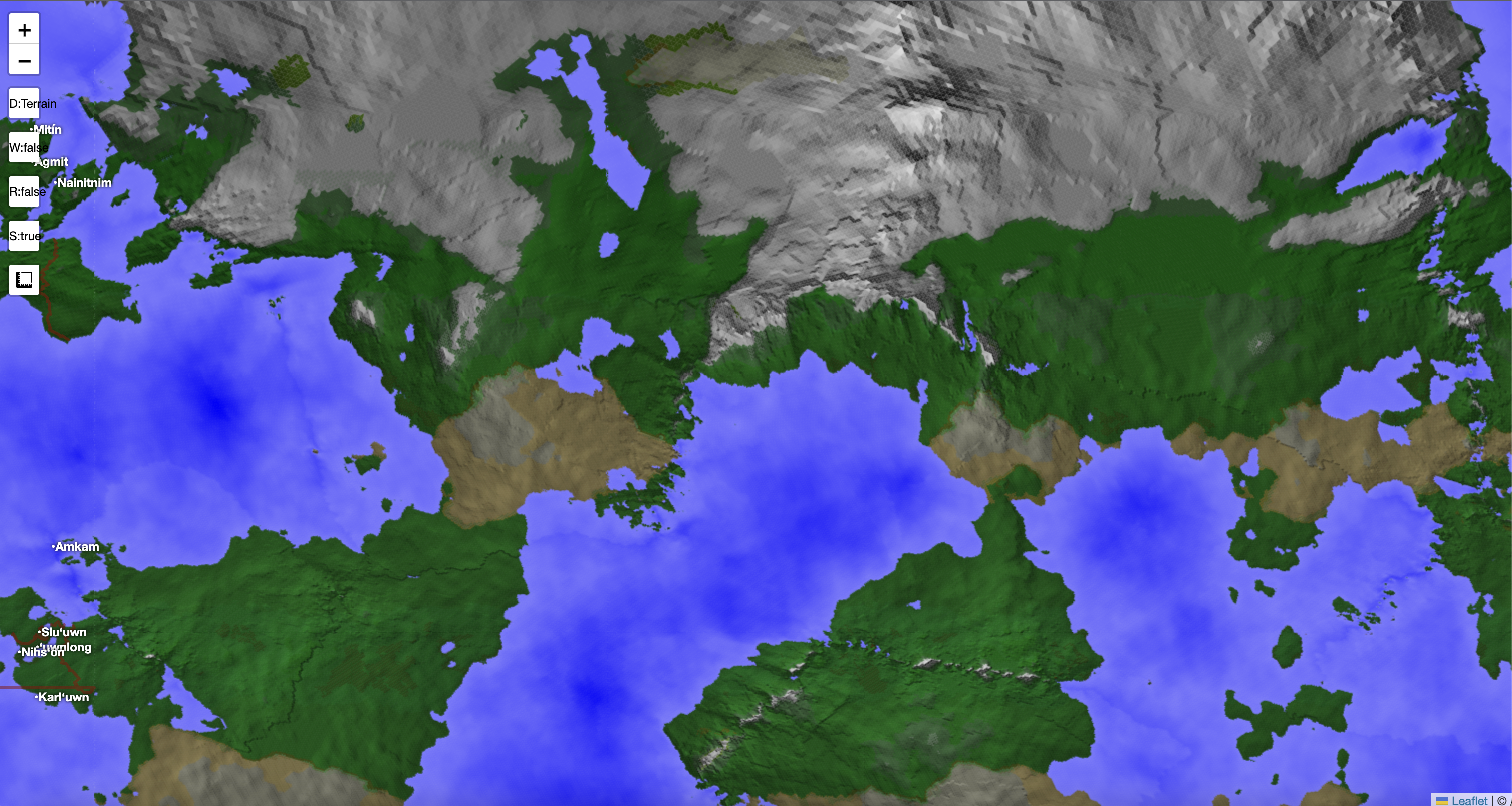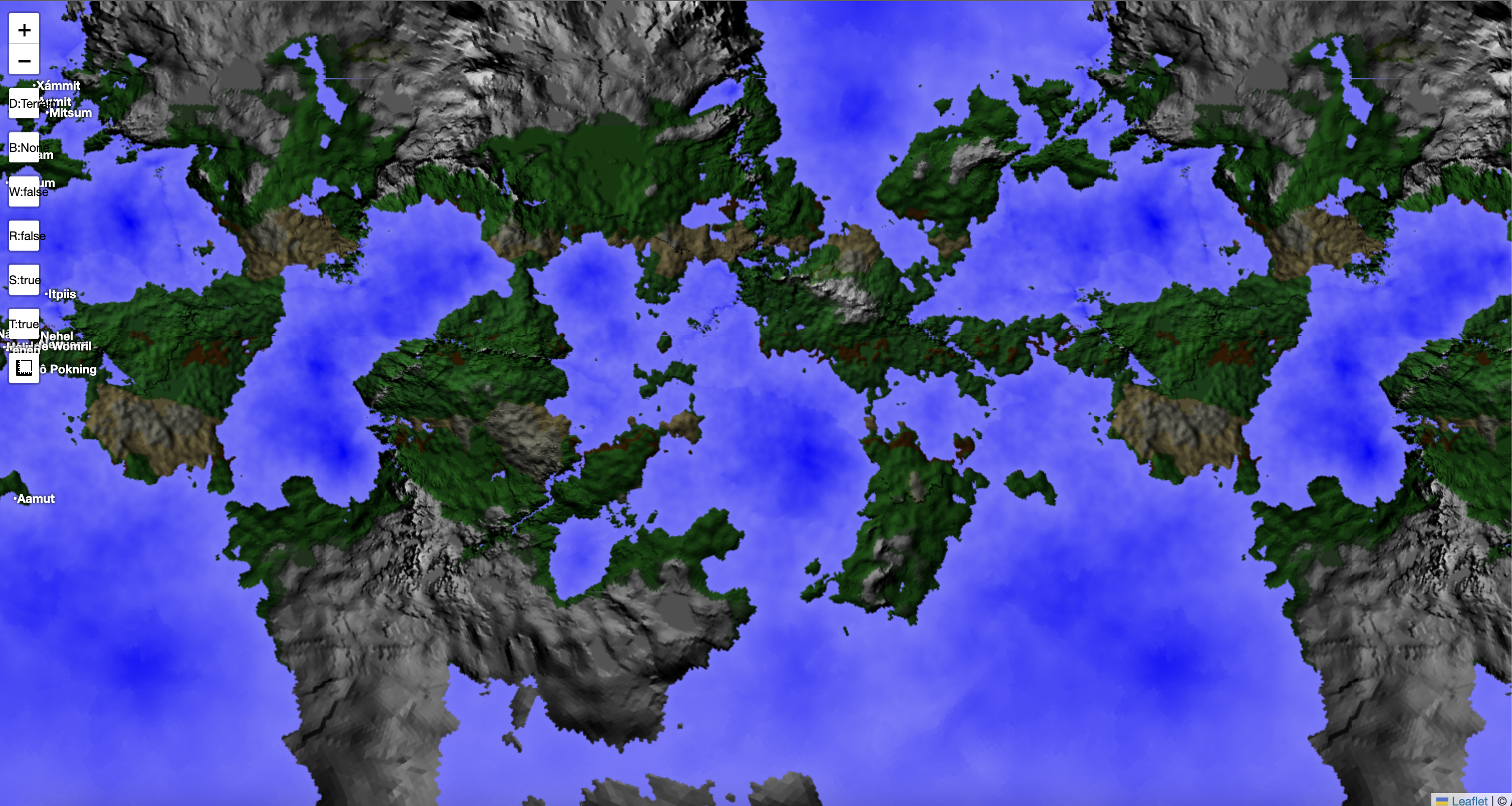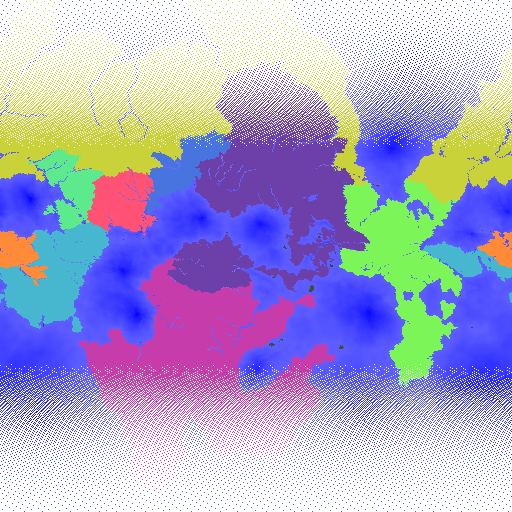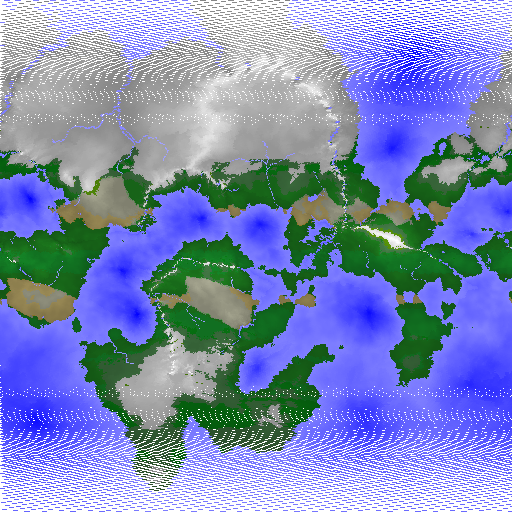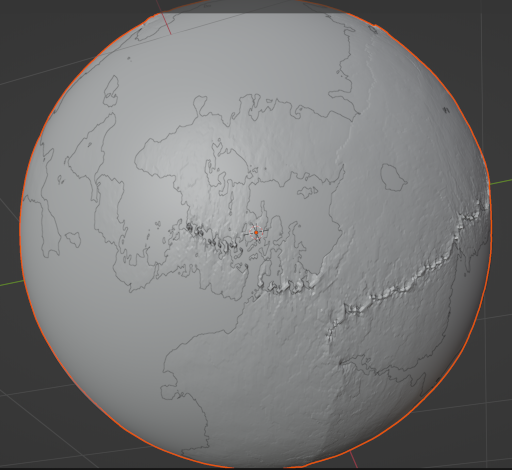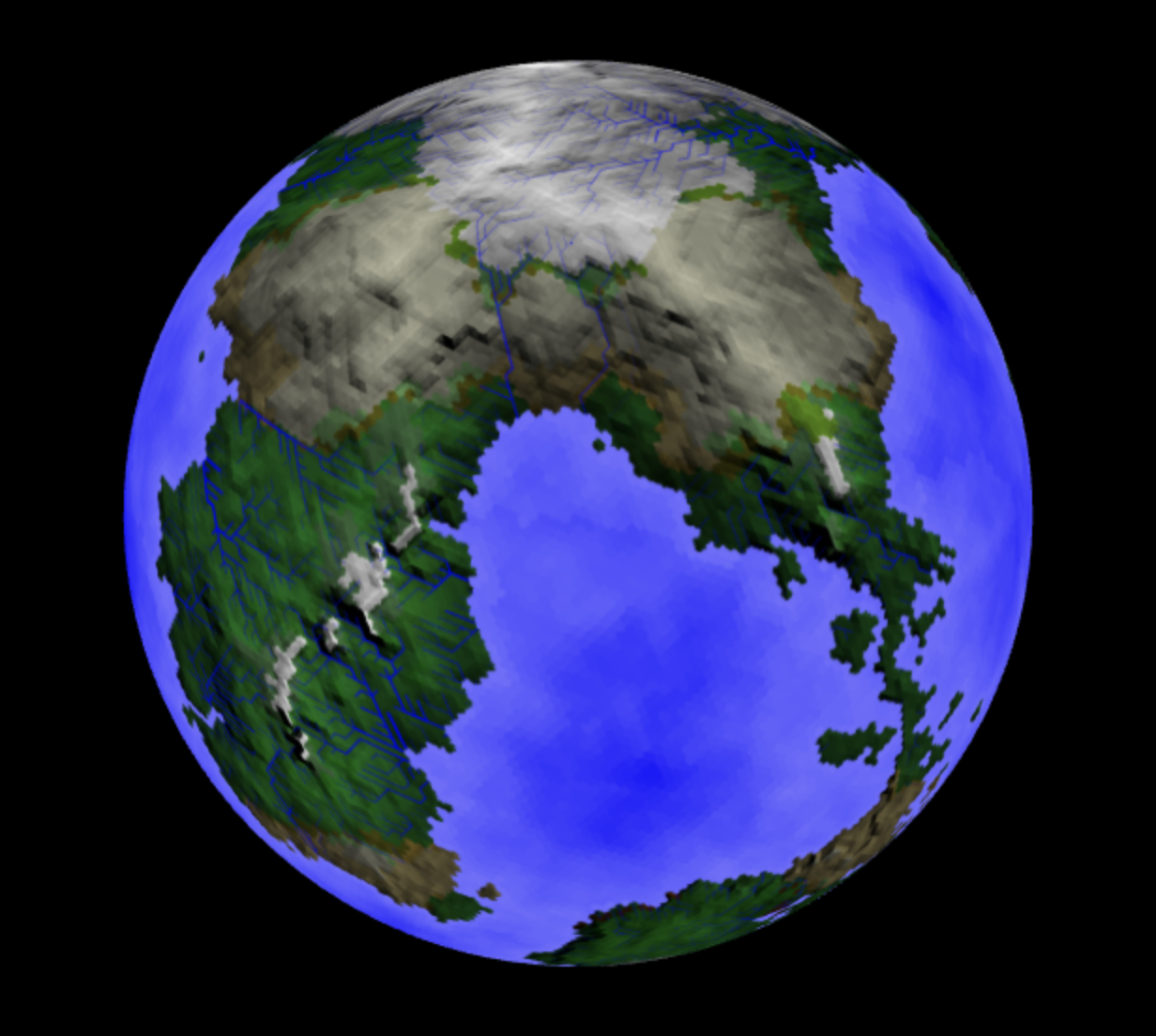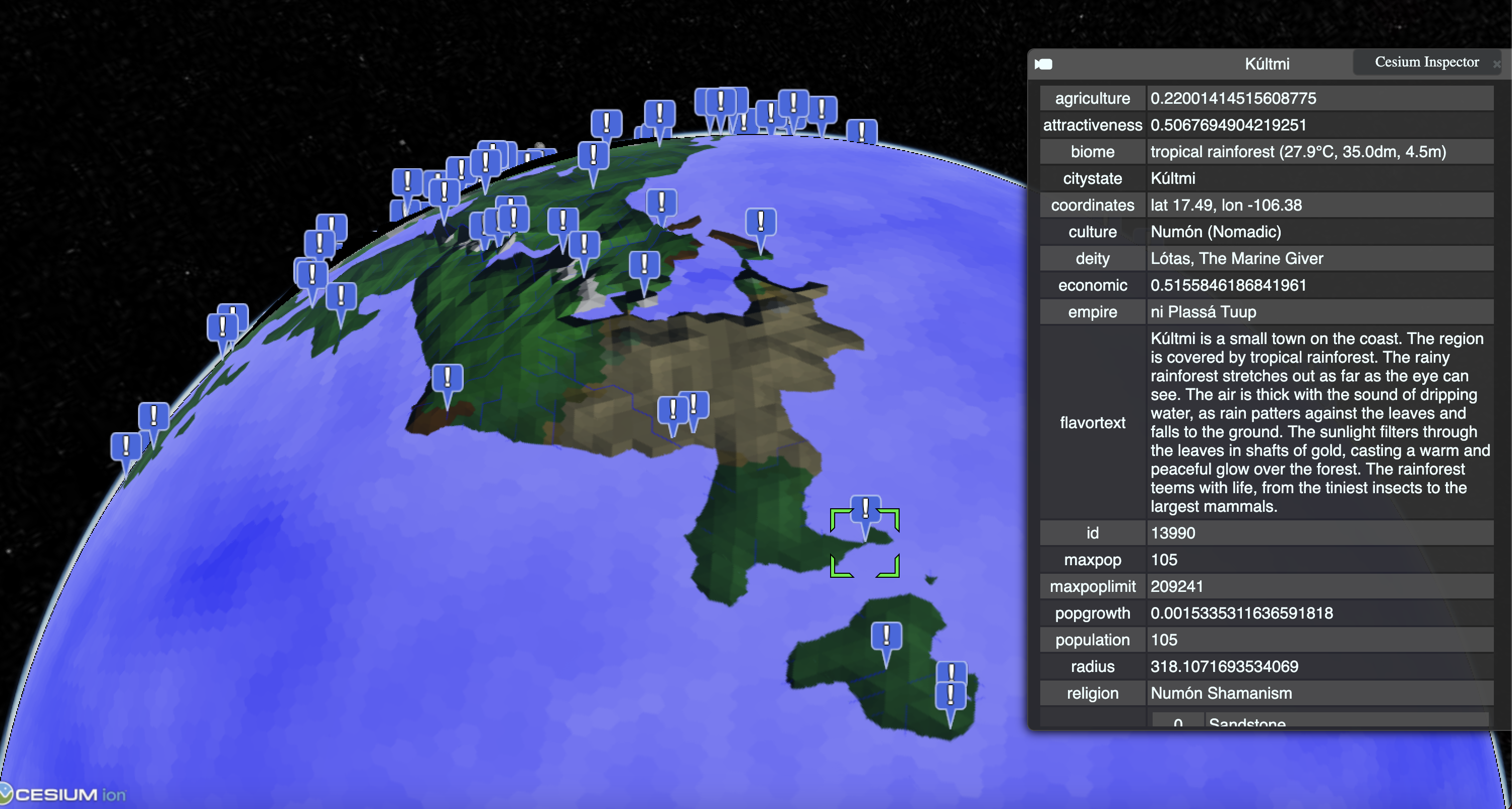 Documentation
¶
Documentation
¶
Overview ¶
Package genworldvoronoi is a port of redblobgames' amazing planet generator. See: https://www.redblobgames.com/x/1843-planet-generation And: https://github.com/redblobgames/1843-planet-generation
Index ¶
- Constants
- Variables
- func P(probability float64) bool
- type City
- type CityState
- type Civ
- func (m *Civ) AddCultureAt(r int, c *Culture, grow bool) *Culture
- func (m *Civ) CalcCityScore(sf func(int) float64, distSeedFunc func() []int) []float64
- func (m *Civ) CalcCityScoreWithDistanceField(sf func(int) float64, regDistanceC []float64) []float64
- func (m *Civ) ExpandCityStates()
- func (m *Civ) ExpandCultures()
- func (m *Civ) ExpandReligions()
- func (m *Civ) GenerateCivilization()
- func (m *Civ) GenerateTimeOfSettlement()
- func (m *Civ) GetCity(r int) *City
- func (m *Civ) GetCityState(id int) *CityState
- func (m *Civ) GetCityStates() []*CityState
- func (m *Civ) GetCulture(r int) *Culture
- func (m *Civ) GetEmpire(id int) *Empire
- func (m *Civ) GetEmpires() []*Empire
- func (m *Civ) GetReligion(r int) *Religion
- func (m *Civ) GetTradeRoutes() ([][]int, [][]int)
- func (m *Civ) InitSim()
- func (m *Civ) InitSimSettling()
- func (m *Civ) InitSimTribes()
- func (m *Civ) LogPopulationStats(people []*Person)
- func (m *Civ) LogTribes()
- func (m *Civ) PlaceCity(cType TownType, scoreFunc func(int) float64, distSeedFunc func() []int) *City
- func (m *Civ) PlaceCityStateAt(r int, c *City) *CityState
- func (m *Civ) PlaceCulture(regCultureFunc func(int) CultureType, scoreFunc func(int) float64, ...) *Culture
- func (m *Civ) PlaceCultureAt(r int, grow bool, lang *genlanguage.Language) *Culture
- func (m *Civ) PlaceNCities(n int, cType TownType)
- func (m *Civ) PlaceNCityStates(n int)
- func (m *Civ) PlaceNCultures(n int)
- func (m *Civ) PlaceNEmpires(n int)
- func (m *Civ) PlaceNFolkReligions(n int) []*Religion
- func (m *Civ) PlaceNOrganizedReligions(n int) []*Religion
- func (m *Civ) Tick()
- func (m *Civ) TickCity(c *City, gDisFunc func(int) geo.GeoDisasterChance, cf func(int) *Culture)
- func (m *Civ) TickN(n int)
- func (m *Civ) TickSim()
- type CivConfig
- type CivStats
- type ClampedVal
- type Config
- type Construction
- type Culture
- type CultureType
- type EdgeIndices
- type Empire
- type Event
- type Faction
- type HackyBiome
- type History
- type IndexData
- type Last100
- type Last1000
- type Leadership
- type LifeEvent
- type LocalResouces
- func (r LocalResouces) Add(other LocalResouces) LocalResouces
- func (r LocalResouces) GetGems() []int
- func (r LocalResouces) GetMetals() []int
- func (r LocalResouces) GetStones() []int
- func (r LocalResouces) GetVarious() []int
- func (r LocalResouces) GetWood() []int
- func (r LocalResouces) HasAny() bool
- func (r LocalResouces) Log()
- func (r LocalResouces) Remove(other LocalResouces) LocalResouces
- func (r LocalResouces) String() string
- type Map
- func (m *Map) ExportOBJ(path string) error
- func (m *Map) ExportPng(name string)
- func (m *Map) ExportSVG(path string) error
- func (m *Map) ExportWebp(name string)
- func (m *Map) Get3DTile(x, y, zoom int) *Tile3D
- func (m *Map) GetCitiesInTile(x, y, zoom int) []*City
- func (m *Map) GetGeoJSONBorders(la1, lo1, la2, lo2 float64, zoom, displayMode int) ([]byte, error)
- func (m *Map) GetGeoJSONCities(la1, lo1, la2, lo2 float64, zoom int) ([]byte, error)
- func (m *Map) GetHeightMapTile(x, y, zoom int) []byte
- func (m *Map) GetTile(x, y, zoom, displayMode, vectorMode int, ...) image.Image
- func (m *Map) Tick()
- type MigrationTile
- type ObjectReference
- type Path
- type Person
- type QuantizedMeshHeader
- type RegionProp
- type RegionProximity
- type Religion
- type ResourcePresence
- type ResourceStorage
- func (rs *ResourceStorage) Add(r LocalResouces)
- func (rs *ResourceStorage) AddResource(category, rType, amount int)
- func (rs *ResourceStorage) Has(category, rType, amount int) bool
- func (rs *ResourceStorage) HasHowMuchMissing(category, rType, amount int) int
- func (rs *ResourceStorage) Log()
- func (rs *ResourceStorage) Take(category, rType, amount int)
- type RunningAverage
- type RunningAverageLimit
- type RunningBool
- type Skill
- type StorageType
- type Tile3D
- type TownType
- type TradeTile
- type Tribe
- func (ds Tribe) AddResources(r map[StorageType]int)
- func (ds Tribe) CanConstruct(c *Construction) bool
- func (ds Tribe) Construct(c *Construction) bool
- func (t *Tribe) DevelopSkills(curRegProp *RegionProp, resPres *ResourcePresence)
- func (t *Tribe) GetCultureType() CultureType
- func (t *Tribe) Grow()
- func (t *Tribe) RandomSplit(nextID int) *Tribe
- func (t *Tribe) Ref() ObjectReference
- func (ds Tribe) RemoveResources(r map[StorageType]int)
- func (t *Tribe) SetPath(path *Path)
- func (t *Tribe) Split(id int, newPopulation int) *Tribe
- func (t *Tribe) String() string
- func (t *Tribe) SustainabilityFactor(curRegProp *RegionProp, resPres *ResourcePresence) float64
- type TribePreference
- type TribeType
- type VertexData
Constants ¶
const ( SkillSurvival = "survival" SkillGeneric = "generic" SkillSeafaring = "seafaring" SkillFishery = "fishery" SkillHunting = "hunting" SkillNomadic = "nomadic" SkillClimbing = "climbing" )
const ( // Expansion modes. ReligionExpGlobal = genreligion.ReligionExpGlobal ReligionExpState = genreligion.ReligionExpState ReligionExpCulture = genreligion.ReligionExpCulture )
const ( ResCategoryWood = iota ResCategoryStone ResCategoryMetal ResCategoryGem ResCategoryVarious )
const ( ObjectTypeCity = iota ObjectTypeCityState ObjectTypeEmpire ObjectTypeCulture ObjectTypeReligion ObjectTypeRegion ObjectTypeMountain ObjectTypeRiver ObjectTypeLake ObjectTypeSea ObjectTypeVolcano ObjectTypePerson ObjectTypeTribe )
const ( DisplayModeDefault = 0 DisplayModeOceanPressure = 1 DisplayModeMoisture = 2 DisplayModeRainfall = 3 DisplayModeFlux = 4 DisplayModeCompression = 5 DisplayModeEarthquake = 6 DisplayModeVolcano = 7 DisplayModeRockSlide = 8 DisplayModeFlood = 9 DisplayModeErosion = 10 DisplayModeErosion2 = 11 DisplayModeSteepness = 12 DisplayModeSlope = 13 DisplayModeCityStates = 14 DisplayModeEmpires = 15 DisplayModeCultures = 16 DisplayModeReligions = 17 DisplayModeSpecies = 18 DisplayModePlates = 19 DisplayModeElevation = 20 DisplayModeAirTemperature = 21 DisplayModeOceanTemperature = 22 DisplayModeInsolation = 23 DisplayModePopulation = 24 DisplayModeSuitability = 25 DisplayModeSoilExhaustion = 26 DisplayModeTribes = 27 )
Display modes for tile rendering.
const ResourceTypeAny = -1
Variables ¶
var ( GenderFemale = geneticshuman.GenderFemale GenderMale = geneticshuman.GenderMale )
var ( SSkillHunting = &Skill{ Name: "Hunting", MinScore: 0.4, Chance: 0.4, Biomes: huntingBiomes, Requires: []*Skill{SSkillGathering}, } SSkillGathering = &Skill{ Name: "Gathering", MinScore: 0.2, Chance: 0.4, Biomes: []int{ genbiome.WhittakerModBiomeTemperateGrassland, genbiome.WhittakerModBiomeTropicalRainforest, genbiome.WhittakerModBiomeTemperateRainforest, genbiome.WhittakerModBiomeTemperateSeasonalForest, genbiome.WhittakerModBiomeWoodlandShrubland, genbiome.WhittakerModBiomeTemperateGrassland, genbiome.WhittakerModBiomeBorealForestTaiga, genbiome.WhittakerModBiomeTundra, genbiome.WhittakerModBiomeWetlands, genbiome.WhittakerModBiomeSnow, }, } SSkillWoodworking = &Skill{ Name: "Woodworking", MinScore: 0.5, Chance: 0.4, ResPres: ResourcePresence{Wood: true}, Requires: []*Skill{SSkillGathering}, } SSkillStoneWorking = &Skill{ Name: "Stone Working", MinScore: 0.5, Chance: 0.4, ResPres: ResourcePresence{Stones: true}, Requires: []*Skill{SSkillGathering}, } SSkillMetalWorking = &Skill{ Name: "Metal Working", MinScore: 0.5, Chance: 0.4, ResPres: ResourcePresence{Metals: true}, Requires: []*Skill{SSkillStoneWorking}, } SSkillGemWorking = &Skill{ Name: "Gem Working", MinScore: 0.5, Chance: 0.4, ResPres: ResourcePresence{Gems: true}, Requires: []*Skill{SSkillStoneWorking}, } SSkillFishing = &Skill{ Name: "Fishing", MinScore: 0.9, Chance: 0.1, Biomes: nil, WaterProximity: true, Requires: []*Skill{SSkillGathering}, } SSkillFarming = &Skill{ Name: "Farming", MinScore: 0.9, Chance: 0.4, Biomes: []int{ genbiome.WhittakerModBiomeTemperateGrassland, genbiome.WhittakerModBiomeWetlands, }, Requires: []*Skill{SSkillGathering}, } SSkillHerding = &Skill{ Name: "Herding", MinScore: 0.5, Chance: 0.4, Biomes: []int{ genbiome.WhittakerModBiomeTemperateGrassland, genbiome.WhittakerModBiomeTundra, genbiome.WhittakerModBiomeSubtropicalDesert, genbiome.WhittakerModBiomeSavannah, genbiome.WhittakerModBiomeColdDesert, genbiome.WhittakerModBiomeSnow, }, Requires: []*Skill{SSkillHunting}, } SSkillSettling = &Skill{ Name: "Settling", MinScore: 0.9, Chance: 0.1, Requires: []*Skill{SSkillFarming, SSkillHerding}, Effect: func(t *Tribe) { if t.Type < TribeTypeSettling { t.Type = TribeTypeSettling } log.Printf("Tribe %d has developed a taste for settling down.", t.ID) }, } SSkillSettlingWetlands = &Skill{ Name: "Settling (Wetlands)", MinScore: 0.9, Chance: 0.1, Biomes: []int{ genbiome.WhittakerModBiomeWetlands, }, Requires: []*Skill{SSkillFarming, SSkillGathering, SSkillFishing}, Effect: func(t *Tribe) { if t.Type < TribeTypeSettling { t.Type = TribeTypeSettling } log.Printf("Tribe %d has developed a taste for settling down in the wetlands.", t.ID) }, } SSkillSettlingHighland = &Skill{ Name: "Settling (Highland)", MinScore: 0.9, Chance: 0.1, RegProx: RegionProximity{ Mountain: true, }, Biomes: []int{ genbiome.WhittakerModBiomeColdDesert, genbiome.WhittakerModBiomeSnow, }, Requires: []*Skill{SSkillGathering, SSkillHerding}, Effect: func(t *Tribe) { if t.Type < TribeTypeSettling { t.Type = TribeTypeSettling } log.Printf("Tribe %d has developed a taste for settling down in the highlands.", t.ID) }, } SSkillBoating = &Skill{ Name: "Boating", MinScore: 0.9, Chance: 0.1, WaterProximity: true, Requires: []*Skill{SSkillWoodworking, SSkillFishing}, Effect: func(t *Tribe) { }, } SSkillSeaFaring = &Skill{ Name: "Sea Faring", MinScore: 0.9, Chance: 0.1, RegProx: RegionProximity{ Ocean: true, }, Requires: []*Skill{SSkillBoating}, Effect: func(t *Tribe) { }, } )
Skills that can be developed. TODO: - Skills might depend on other skills. - There might be a chance to lose a skill if the tribe is not using it.
Possible skills: - Hunting (requires grassland, forest, etc.) - Gathering (requires grassland, forest, etc.) - Fishing (requires water proximity) - Farming (requires grassland) - Herding (requires grassland) - Quarrying (requires mountains) - Mining (requires mountains) - Smithing (requires mining) - Weaving (requires plants) - Pottery (requires water proximity) - Carpentry
var GenLanguage = genlanguage.GenLanguage
var GetAdjective = genlanguage.GetAdjective
GetAdjective get adjective form from noun
var GetNounPlural = genlanguage.GetNounPlural
GetNounPlural returns the plural form of a noun. This takes in account "witch" and "fish" which are irregular.
var IsVowel = genlanguage.IsVowel
IsVowel returns true if the given rune is a vowel.
var Skills = []*Skill{ SSkillHunting, SSkillGathering, SSkillWoodworking, SSkillStoneWorking, SSkillMetalWorking, SSkillGemWorking, SSkillFishing, SSkillFarming, SSkillHerding, SSkillSettling, SSkillSettlingWetlands, SSkillSettlingHighland, SSkillBoating, SSkillSeaFaring, }
var TrimVowels = genlanguage.TrimVowels
TrimVowels remove vowels from the end of the string.
Functions ¶
Types ¶
type City ¶
type City struct {
ID int // Region where the city is located
Name string // Name of the city
Type TownType // Type of city
SecondaryTypes []TownType // Secondary types of the city
Score float64 // Score of the fitness function
Population int // Population of the city
MaxPopulation int // Maximum population of the city
Culture *Culture // Culture of the city region
Language *genlanguage.Language // Language of the city
Religion *Religion // Religion originating from the city
Founded int64 // Year when the city was founded
PotentialEconomic float64 // Economic potential of the city (DYNAMIC)
PotentialTrade float64 // Trade value of the city (DYNAMIC)
PotentialResources float64 // Resources value of the city (PARTLY DYNAMIC)
PotentialAgricultural float64 // Agriculture value of the city (STATIC)
Attractiveness float64 // Attractiveness of the city (STATIC)
TradePartners []int // IDs of cities within trade range
People []*Person // People living in the city
}
City represents a city in the world.
func (*City) MaxPopulationLimit ¶
MaxPopulationLimit returns the maximum population sustainable by the city.
func (*City) PopulationGrowthRate ¶
PopulationGrowthRate returns the population growth rate per year.
func (*City) Ref ¶
func (c *City) Ref() ObjectReference
Ref returns the object reference of the city.
type CityState ¶
type CityState struct {
ID int // Region where the city state originates
Capital *City // Capital city
Culture *Culture // Culture of the city state
Cities []*City // Cities within the city state
Founded int64 // Year when the city state was founded
// TODO: DO NOT CACHE THIS!
Regions []int
*geo.Stats
}
CityState represents a territory governed by a single city.
type Civ ¶
type Civ struct {
*CivConfig
*geo.Geo
*History
People []*Person // People in the world
Empires []*Empire // (political) Empires
RegionToEmpire []int // (political) Point / region mapping to territory / empire
CityStates []*CityState // (political) City states
RegionToCityState []int // (political) Point / region mapping to city / city state
Cities []*City // (political) City seed points / regions
RegionToCulture []int // (cultural) Point / region mapping to culture
Cultures []*Culture // (cultural) Culture seed points / regions
RegionToReligion []int // (cultural) Point / region mapping to religion
Religions []*Religion // (cultural) Religion seed points / regions
Settled []int64 // (cultural) Time of settlement per region
// SettledBySpecies []int // (cultural) Which species settled the region first
NameGen *genlandmarknames.NameGenerators
TradeRoutes [][]int
// Temp population per region.
Population []int
SoilExhaustion []float64
Suitability []float64
Tribes []*Tribe
TribeCount int // Running count of tribes (for ID generation)
// contains filtered or unexported fields
}
func (*Civ) AddCultureAt ¶
AddCultureAt adds a culture at the given region.
func (*Civ) CalcCityScore ¶
CalcCityScore calculates the fitness value for settlements for all regions.
'sf': Fitness function for scoring a region. 'distSeedFunc': Returns a number of regions from which we maximize the distance.
func (*Civ) CalcCityScoreWithDistanceField ¶
func (*Civ) ExpandCityStates ¶
func (m *Civ) ExpandCityStates()
ExpandCityStates expands the city states on the map based on their culture, terrain preference, and other factors.
func (*Civ) ExpandCultures ¶
func (m *Civ) ExpandCultures()
ExpandCultures expands the cultures on the map based on their expansionism, terrain preference, and distance to other cultures.
func (*Civ) ExpandReligions ¶
func (m *Civ) ExpandReligions()
func (*Civ) GenerateCivilization ¶
func (m *Civ) GenerateCivilization()
func (*Civ) GenerateTimeOfSettlement ¶
func (m *Civ) GenerateTimeOfSettlement()
func (*Civ) GetCityState ¶
func (*Civ) GetCityStates ¶
func (*Civ) GetCulture ¶
GetCulture returns the culture of the given region (if any).
func (*Civ) GetEmpires ¶
func (*Civ) GetReligion ¶
GetReligion returns the religion of the given region (if any).
func (*Civ) GetTradeRoutes ¶
func (*Civ) InitSimSettling ¶
func (m *Civ) InitSimSettling()
func (*Civ) InitSimTribes ¶
func (m *Civ) InitSimTribes()
func (*Civ) LogPopulationStats ¶
func (*Civ) PlaceCity ¶
func (m *Civ) PlaceCity(cType TownType, scoreFunc func(int) float64, distSeedFunc func() []int) *City
PlaceCity places another city at the region with the highest fitness score.
func (*Civ) PlaceCulture ¶
func (m *Civ) PlaceCulture(regCultureFunc func(int) CultureType, scoreFunc func(int) float64, distSeedFunc func() []int, lang *genlanguage.Language) *Culture
PlaceCulture places another culture on the map at the region with the highest fitness score.
func (*Civ) PlaceCultureAt ¶
PlaceCultureAt places a culture at the given region. TODO: Allow specifying the culture type?
func (*Civ) PlaceNCities ¶
PlaceNCities places n cities with the highest fitness scores.
func (*Civ) PlaceNCityStates ¶
func (*Civ) PlaceNCultures ¶
PlaceNCultures places n cultures on the map. This code is based on: https://github.com/Azgaar/Fantasy-Map-Generator/blob/master/modules/cultures-generator.js
func (*Civ) PlaceNEmpires ¶
func (*Civ) PlaceNFolkReligions ¶
PlaceNFolkReligions generates folk religions.
func (*Civ) PlaceNOrganizedReligions ¶
PlaceNOrganizedReligions generates organized religions.
type CivConfig ¶
type CivConfig struct {
NumCultures int // (Min) Number of generated cultures
NumOrganizedReligions int // (Min) Number of generated religions
NumEmpires int // Number of generated territories
NumCities int // Number of generated cities (regions)
NumCityStates int // Number of generated city states
NumMiningTowns int // Number of generated mining towns
NumMiningGemsTowns int // Number of generated (gem) mining towns
NumQuarryTowns int // Number of generated quarry towns
NumFarmingTowns int // Number of generated farming towns
NumTradingTowns int // Number of generated trading towns
NumDesertOasis int // Number of generated desert oases
EnableCityAging bool // Enable city aging
EnableOrganizedReligions bool // Enable organized religion generation
// In case of disaster, overpopulation, etc. a percentage of the population might migrate to a new location.
MigrationOverpopulationExcessPopulationFactor float64 // Factor of excess population to migrate in case of overpopulation.
MigrationOverpopulationMinPopulationFactor float64 // Minimum factor of total population to migrate in case of overpopulation.
MigrationToNClosestCities int // Number of the N closest cities to migrate to (in case of disaster)
MigrationToNewSettlementWithinNRegions int // Depth of graph traversal for finding a suitable new settlement location.
MigrationFatalityChance float64 // Chance of death during migration per region traversed.
}
CivConfig is a struct that holds all configuration options for civilization generation.
func NewCivConfig ¶
func NewCivConfig() *CivConfig
NewCivConfig returns a new config for civilization generation.
type CivStats ¶
type CivStats struct {
Cultures map[*Culture]int // Number of regions per culture.
Religions map[*Religion]int // Number of regions per religion.
CityStates map[*CityState]int // Number of regions per city state.
Empires map[*Empire]int // Number of regions per empire.
}
CivStats contains statistics about civilization related aspects present given a list of regions. This will allow us for example to determine if the primary culture or religion of the empire is different from the capital, which might be destabilizing, etc.
type ClampedVal ¶
type ClampedVal float64
func (*ClampedVal) Add ¶
func (c *ClampedVal) Add(v float64)
type Construction ¶
type Construction struct {
Name string
Cost map[StorageType]int
Produces map[StorageType]int // Produces each turn.
}
type Culture ¶
type Culture struct {
ID int // Region where the culture originates
Name string // Name of the culture
Type CultureType // Type of the culture
Expansionism float64 // Expansionism of the culture
Martialism float64 // Martial skills of the culture
Spirituality float64 // Spirituality of the culture (religion, superstition, etc.)
// Sophistication float64
// Extremism float64 ?
// Openness float64 ?
// Parent *Culture
// Children []*Culture
// Extinct bool
Language *genlanguage.Language // Language of the culture
Religion *Religion // Religion of the culture
// TODO: DO NOT CACHE THIS!
Regions []int
*geo.Stats
}
Culture represents a culture.
Also see: https://ck3.paradoxwikis.com/Culture
TODO:
VALUES ¶
The type of culture will also influence their values. For example, a nomadic or a hunting culture will have higher regart for martial skills and lower regard for sophistication.
I would propose to have a point pool for these attributes and then randomly assign them to the various skills with a certain distribution based on the culture type.
CRAFTS AND SKILLS ¶
The culture will also have a set of crafts, arts, and skills that they are good at. This will be based on their values and the environment they live in.
For example, a nomadic culture will be good at hunting and tracking. They might be exceptional at crafting leather wares (like saddles), and bows.
A river culture will have a ready supply of clay, and will be good at pottery, but not at crafin leather wares like saddles.
A mountain culture will be good at mining, prospecting, and stone carving. If they mine precious metals, they will be good at jewelry making.
A naval culture will be good at ship building, and sailing. Since they might have sea shells as a ready supply, they might be good at jewelry making.
ARTS ¶
Arts will be based on the environment and the values of the culture. For example, a river culture might focus on water and rivers, as well as the flora and fauna related to rivers.
A mountain culture might use iconography to represent the harshness of the mountains, and the gifts of the mines.
func (*Culture) SetNewType ¶
func (c *Culture) SetNewType(t CultureType)
type CultureType ¶
type CultureType int
const ( CultureTypeWildland CultureType = iota CultureTypeGeneric CultureTypeRiver CultureTypeLake CultureTypeNomadic CultureTypeHunting CultureTypeHighland )
Culture types.
func (CultureType) BiomeCost ¶
func (t CultureType) BiomeCost(biome int) float64
BiomeCost returns the cost for traversion / expanding into a given biome.
func (CultureType) CellTypeCost ¶
func (t CultureType) CellTypeCost(cellType int) float64
CellTypeCost returns the cost of crossing / navigating a given cell type for a given culture.
func (CultureType) Expansionism ¶
func (t CultureType) Expansionism() float64
Expansionism returns the expansionism of a given culture type.
func (CultureType) Martialism ¶
func (t CultureType) Martialism() float64
Martialism returns the martialism of a given culture type.
func (CultureType) Spirituality ¶
func (t CultureType) Spirituality() float64
Spirituality returns the spirituality of a given culture type. TODO: Replace this with a more meaningful value.
func (CultureType) String ¶
func (c CultureType) String() string
String returns the string representation of a given culture type.
type EdgeIndices ¶
type EdgeIndices struct {
WestVertexCount uint32
WestIndices []uint32 // [westVertexCount]uint32
SouthVertexCount uint32
SouthIndices []uint32 // [southVertexCount]uint32
EastVertexCount uint32
EastIndices []uint32 // [eastVertexCount]uint32
NorthVertexCount uint32
NorthIndices []uint32 // [northVertexCount]uint32
}
Following the triangle indices is four more lists of indices: Depending on the number of vertices, the tile uses either EdgeIndices16 or EdgeIndices32.
type Empire ¶
type Empire struct {
ID int // Region where the empire originates (capital)
Name string // Name of the empire
Emperor string // Name of the ruler
Capital *City // Capital city
Cities []*City // Cities within the territory
Culture *Culture // Primary culture of the empire
Language *genlanguage.Language // Primary language of the empire
// TODO: DO NOT CACHE THIS!
Regions []int // Regions that are part of the empire
*geo.Stats
}
Empire contains information about a territory with the given ID. TODO: Maybe drop the regions since we can get that info relatively cheaply.
type Event ¶
type Event struct {
Year int64 // TODO: Allow different types of time.
Type string // Maybe use an enum?
Msg string // Message that describes the event.
ID ObjectReference // Reference to the object that the event is about.
}
type Faction ¶
type Faction struct {
Name string // Name of the faction.
*Leadership
}
Faction represents a faction within a tribe or a city state.
type HackyBiome ¶
type HackyBiome int
func (HackyBiome) String ¶
func (b HackyBiome) String() string
type History ¶
func NewHistory ¶
type IndexData ¶
type IndexData struct {
TriangleCount uint32
// Either Indices16 or Indices32 is used, depending on the number of vertices.
// Indices16 []uint16 // [triangleCount * 3]uint16
Indices []uint32 // [triangleCount * 3]uint32
}
Immediately following the vertex data is the index data. Indices specify how the vertices are linked together into triangles. If tile has more than 65536 vertices, the tile uses the IndexData32 structure to encode indices. Otherwise, it uses the IndexData16 structure.
To enforce proper byte alignment, padding is added before the IndexData to ensure 2 byte alignment for IndexData16 and 4 byte alignment for IndexData32.
Indices are encoded using the high water mark encoding from webgl-loader. Each triplet of indices specifies one triangle to be rendered, in counter-clockwise winding order.
type Last100 ¶
type Last100[T ~int] struct { // contains filtered or unexported fields }
Last100 is a counter that keeps track of the last 100 values.
func (*Last100[T]) GetScoreOf ¶
GetScoreOf returns the score of the given value in the last 100 values.
type Last1000 ¶
type Last1000[T ~int] struct { // contains filtered or unexported fields }
func (*Last1000[T]) GetScoreOf ¶
getScoreOf returns the score of the given value in the last 1000 values.
type Leadership ¶
type Leadership struct {
// TODO: Add leadership properties.
// Type (e.g. democratic, autocratic, etc.
// Titles (e.g. king, council, etc.)
// Leader(s) (e.g. council, king, etc.)
Leaders []string
// Influence ClampedVal // Influence or popularity will determine the power of the leadership.
Popularity ClampedVal // Popularity will determine the happiness of the tribe.
}
Leadership represents the leadership of a tribe or faction.
func (*Leadership) String ¶
func (l *Leadership) String() string
String returns a string representation of the leadership.
type LocalResouces ¶
type LocalResouces struct {
Wood byte // Available wood types.
Stones byte // Available stone types.
Metals byte // Available metal types.
Gems byte // Available gem types.
Various byte // Various resources.
}
LocalResouces represents the resources available in a region.
func (LocalResouces) Add ¶
func (r LocalResouces) Add(other LocalResouces) LocalResouces
func (LocalResouces) GetGems ¶
func (r LocalResouces) GetGems() []int
func (LocalResouces) GetMetals ¶
func (r LocalResouces) GetMetals() []int
func (LocalResouces) GetStones ¶
func (r LocalResouces) GetStones() []int
func (LocalResouces) GetVarious ¶
func (r LocalResouces) GetVarious() []int
func (LocalResouces) GetWood ¶
func (r LocalResouces) GetWood() []int
func (LocalResouces) HasAny ¶
func (r LocalResouces) HasAny() bool
HasAny returns true if there are any resources available.
func (LocalResouces) Log ¶
func (r LocalResouces) Log()
func (LocalResouces) Remove ¶
func (r LocalResouces) Remove(other LocalResouces) LocalResouces
func (LocalResouces) String ¶
func (r LocalResouces) String() string
type Map ¶
type Map struct {
*geo.Geo // Geography / geology
*bio.Bio // Plants / animals / funghi
*Civ // Civilization
}
func (*Map) ExportSVG ¶
ExportSVG exports the terrain as SVG to the given path. NOTE: This produces broken somewhat incomplete output due to the wraparound of the mesh.
func (*Map) ExportWebp ¶
func (*Map) Get3DTile ¶
Get3DTile returns the quantized 3D tile for the given x, y, and zoom. WARNING: THIS DOES NOT WORK YET!!!!!
func (*Map) GetCitiesInTile ¶
GetCitiesInTile returns all cities within the given tile coordinates and zoom level.
func (*Map) GetGeoJSONBorders ¶
GetGeoJSONBorders returns all borders as GeoJSON within the given bounds and zoom level.
func (*Map) GetGeoJSONCities ¶
GetGeoJSONCities returns all cities as GeoJSON within the given bounds and zoom level.
func (*Map) GetHeightMapTile ¶
type MigrationTile ¶
type MigrationTile struct {
// contains filtered or unexported fields
}
func (*MigrationTile) PathEstimatedCost ¶
func (n *MigrationTile) PathEstimatedCost(to goastar.Pather) float64
PathEstimatedCost is a heuristic method for estimating movement costs between non-adjacent nodes.
func (*MigrationTile) PathNeighborCost ¶
func (n *MigrationTile) PathNeighborCost(to goastar.Pather) float64
PathNeighborCost calculates the exact movement cost to neighbor nodes.
func (*MigrationTile) PathNeighbors ¶
func (n *MigrationTile) PathNeighbors() []goastar.Pather
PathNeighbors returns the direct neighboring nodes of this node which can be pathed to.
func (*MigrationTile) SetUsed ¶
func (n *MigrationTile) SetUsed()
type ObjectReference ¶
type Path ¶
func (*Path) NumRemaining ¶
NumRemaining returns the number of steps remaining in the path.
type Person ¶
type Person struct {
ID int // ID of the person
Region int // Location of the person
Genes genetics.Genes // Genes.
City *City // City of the person
Culture *Culture // Culture of the person
// Todo: Allow different naming conventions.
FirstName string
LastName string
NickName string
// Birth, death...
// TODO: Add death cause.
Age int // Age of the person.
Birth LifeEvent
Death LifeEvent
// Pregnancy
PregnancyCounter int // Days of pregnancy
Prengancy *Person // baby (TODO: twins, triplets, etc.)
// Family (TODO: Distinguish between known and unknown family members.)
// Maybe use a map of relations to people?
Mother *Person
Father *Person
Spouse *Person // TODO: keep track of spouses that might have perished?
Children []*Person // TODO: Split into known and unknown children.
}
Person represents a person in the world. TODO: Improve efficiency of this struct.
- We could drop age, and use day-ticks for birth and death instead.
- Also, we can get the gender directly from the genes.
- We might be able to drop the pregnancy counter and use the birth life event of the child as a counter.
- We can use use the Region for the location and derive the city from that.
- A lot of this stuff is identical to simvillage_simple, so we could probably merge the person logic somehow, or move it to a separate package.
func (*Person) Gender ¶
func (p *Person) Gender() geneticshuman.Gender
Gender returns the gender of the person.
func (*Person) Ref ¶
func (p *Person) Ref() ObjectReference
Ref returns the object reference of the person.
type QuantizedMeshHeader ¶
type QuantizedMeshHeader struct {
// The center of the tile in Earth-centered Fixed coordinates.
CenterX float64
CenterY float64
CenterZ float64
// The minimum and maximum heights in the area covered by this tile.
// The minimum may be lower and the maximum may be higher than
// the height of any vertex in this tile in the case that the min/max vertex
// was removed during mesh simplification, but these are the appropriate
// values to use for analysis or visualization.
MinimumHeight float32
MaximumHeight float32
// The tile’s bounding sphere. The X,Y,Z coordinates are again expressed
// in Earth-centered Fixed coordinates, and the radius is in meters.
BoundingSphereCenterX float64
BoundingSphereCenterY float64
BoundingSphereCenterZ float64
BoundingSphereRadius float64
// The horizon occlusion point, expressed in the ellipsoid-scaled Earth-centered Fixed frame.
// If this point is below the horizon, the entire tile is below the horizon.
// See http://cesiumjs.org/2013/04/25/Horizon-culling/ for more information.
HorizonOcclusionPointX float64
HorizonOcclusionPointY float64
HorizonOcclusionPointZ float64
}
type RegionProp ¶
type RegionProp struct {
Biome HackyBiome
RegionProximity
}
func (*RegionProp) Log ¶
func (r *RegionProp) Log()
type RegionProximity ¶
type Religion ¶
type Religion struct {
ID int // The region where the religion was founded
Name string // The name of the religion
NameGen *genstory.Generated // The name generation information
Culture *Culture // The culture that the religion is based on
Parent *Religion // The parent religion (if any)
*genreligion.Classification // The religion classification
Deity *genreligion.Deity // The deity of the religion (if any)
Expansion string // How the religion wants to expand
Expansionism float64 // How much the religion wants to expand
Founded int64 // Year when the religion was founded
}
Religion represents a religion in the world.
TODO: Ensure we can infer symbolisms from events and other things.
For example, if they worship the 99 beer bottles on the wall, we should be able to infer that they highly value beer and the number 99, as well as walls. They might be fearful of the number 100, and might have a taboo against the number 1. They might look kindly on people who can drink 99 beers in a row.
Another example: If they worship the sun, we should be able to infer that they highly value the sun, and that they might be fearful of the moon. They might have a celebration during the summer solstice and consider a total eclipse of the sun to be a bad omen and a moon eclipse to be a good omen.
DEITIES AND SYMBOLS ¶
Folk religions that are purely based on the culture might warship nature itself, such as the sun, summer, the rain, a particular animal, or a particular plant. They might worship one or multiple deities that represent nature, like the sun god, the rain god, the god of the forest.
Organized religions might either worship one or multiple gods, or a single person that is considered to be a god (or chosen).
GRAPH ¶
All these themes and connections could be represented as a graph, which would allow us to infer the relationships between deities and symbols and if mundane events hold any significance for a particular religion.
type ResourcePresence ¶
type ResourceStorage ¶
type ResourceStorage struct {
Wood [geo.ResMaxWoods]int
Stone [geo.ResMaxStones]int
Metal [geo.ResMaxMetals]int
Gem [geo.ResMaxGems]int
Various [geo.ResMaxVarious]int
// contains filtered or unexported fields
}
func (*ResourceStorage) Add ¶
func (rs *ResourceStorage) Add(r LocalResouces)
func (*ResourceStorage) AddResource ¶
func (rs *ResourceStorage) AddResource(category, rType, amount int)
func (*ResourceStorage) Has ¶
func (rs *ResourceStorage) Has(category, rType, amount int) bool
func (*ResourceStorage) HasHowMuchMissing ¶
func (rs *ResourceStorage) HasHowMuchMissing(category, rType, amount int) int
func (*ResourceStorage) Log ¶
func (rs *ResourceStorage) Log()
func (*ResourceStorage) Take ¶
func (rs *ResourceStorage) Take(category, rType, amount int)
type RunningAverage ¶
type RunningAverage struct {
// contains filtered or unexported fields
}
RunningAverage is a running average that takes the historical values into account.
func (*RunningAverage) Add ¶
func (ra *RunningAverage) Add(v float64)
Add adds a new value to the running average.
func (*RunningAverage) CopyTo ¶
func (ra *RunningAverage) CopyTo(other *RunningAverage)
CopyTo copies the running average to the other running average.
func (*RunningAverage) Current ¶
func (ra *RunningAverage) Current() float64
Current returns the current average.
type RunningAverageLimit ¶
type RunningAverageLimit struct {
RunningAverage
// contains filtered or unexported fields
}
RunningaverageLimit is a running average that limits the number of historical values that are taken into account.
func NewRunningAverageLimit ¶
func NewRunningAverageLimit(limit int) *RunningAverageLimit
NewRunningAverageLimit creates a new running average with a limit.
func (*RunningAverageLimit) Add ¶
func (ra *RunningAverageLimit) Add(v float64)
Add adds a new value to the running average.
func (*RunningAverageLimit) CopyTo ¶
func (ra *RunningAverageLimit) CopyTo(other *RunningAverageLimit)
CopyTo copies the running average to the other running average.
type RunningBool ¶
type RunningBool struct {
RunningAverage
}
func NewRunningBool ¶
func NewRunningBool() *RunningBool
func (*RunningBool) Add ¶
func (ra *RunningBool) Add(v bool)
func (*RunningBool) CopyTo ¶
func (ra *RunningBool) CopyTo(other *RunningBool)
func (*RunningBool) Current ¶
func (ra *RunningBool) Current() bool
func (*RunningBool) Reset ¶
func (ra *RunningBool) Reset()
type Skill ¶
type Skill struct {
Name string
MinScore float64 // The minimum score required to develop the skill.
Chance float64 // The chance of developing the skill.
Biomes []int // The biomes the skill can be developed in.
ResPres ResourcePresence // The resources required to develop the skill.
WaterProximity bool // If the skill requires water proximity. TODO: Get rid of this.
RegProx RegionProximity // The region proximity required to develop the skill.
Requires []*Skill // Required skills to develop this skill.
Effect func(t *Tribe) // The effect of the skill on the tribe.
}
func (*Skill) CanDevelopIn ¶
func (s *Skill) CanDevelopIn(curRegProp *RegionProp, resPres *ResourcePresence) bool
func (*Skill) EffectOnTribe ¶
EffectOnTribe applies the effect of the skill on the tribe.
func (*Skill) GetBonusForBiome ¶
func (s *Skill) GetBonusForBiome(curRegProp *RegionProp, resPres *ResourcePresence) float64
GetBonusForBiome returns a bonus score derived from the skill based on the biome and water proximity.
type StorageType ¶
type StorageType int
const ( StorageWood StorageType = iota StorageFood StorageLeather StorageHousing StorageMax )
func (StorageType) String ¶
func (s StorageType) String() string
type Tile3D ¶
type Tile3D struct {
Header QuantizedMeshHeader
Vertex VertexData
Index IndexData
Edge EdgeIndices
}
Each tile is a specially-encoded triangle mesh where vertices overlap their neighbors at tile edges. In other words, at the root, the eastern-most vertices in the western tile have the same longitude as the western-most vertices in the eastern tile.
Terrain tiles are served gzipped. Once extracted, tiles are little-endian, binary data.
type TownType ¶
type TownType string
TownType represents the type of a city.
const ( TownTypeDefault TownType = "town" TownTypeTrading TownType = "trading" TownTypeMining TownType = "mining" TownTypeMiningGems TownType = "mining (gems)" TownTypeQuarry TownType = "quarry" TownTypeFarming TownType = "agricultural" TownTypeDesertOasis TownType = "desert oasis" )
The different types of cities.
func (TownType) FoundingPopulation ¶
FoundingPopulation returns the starting population of a city type.
func (TownType) GetDistanceSeedFunc ¶
GetDistanceSeedFunc returns the distance seed function for a city type.
type TradeTile ¶
type TradeTile struct {
// contains filtered or unexported fields
}
func (*TradeTile) PathEstimatedCost ¶
PathEstimatedCost is a heuristic method for estimating movement costs between non-adjacent nodes.
func (*TradeTile) PathNeighborCost ¶
PathNeighborCost calculates the exact movement cost to neighbor nodes.
func (*TradeTile) PathNeighbors ¶
PathNeighbors returns the direct neighboring nodes of this node which can be pathed to.
type Tribe ¶
type Tribe struct {
ID int // Unique ID for the tribe.
RegionID int // The region the tribe is currently in.
Population int // The population of the tribe.
Type TribeType // The type of the tribe (nomadic, settled, city state, empire, etc.)
Parent *Tribe // The parent tribe of the tribe.
Language *genlanguage.Language // The language of the tribe.
Settlement *City // The city the tribe has settled in.
Culture *Culture // Culture that the tribe might have developed.
Religion *Religion // Religion that the tribe might have developed.
CityState *CityState // City state that the tribe might have developed.
Empire *Empire // Empire that the tribe might have developed.
// TODO: Change this to a running average.
Satisfaction ClampedVal // Happiness of the tribe overall.
SatisfactionAvg *RunningAverageLimit // Running average of the tribe's satisfaction.
Leadership *Faction // Current leadership of the tribe.
Factions []*Faction // Factions within the tribe / opposition, etc.
Skills map[*Skill]bool // Skills of the tribe.
// Preferences of the tribe.
TribePreference
*Path // Pathfinding for migrating tribes.
*ResourceStorage // Resources the tribe has.
// contains filtered or unexported fields
}
We start with one tribe. This tribe will be nomadic, and will move around. After a while, the tribe might be big enough to split into two tribes.
A tribe can split due to: - Survival reasons (not enough food, etc. in the regions in their proximity). - Religious reasons (a new vision from the gods, etc.). - TODO: Cultural reasons (a different culture type preference, etc.). - TODO: Unhappiness (a string of bad events, deaths, famine, etc.).
When a tribe splits, the new tribe will have a part of the population of the original tribe and retain some of the culture, religion, etc. of the original tribe. (In the future, we might want to consider that we fork the culture, religion, etc. of the original tribe as soon as the new tribe is created, not only when the tribe settles.).
Settled Tribes:
Tribes can either be settled or nomadic. Once a tribe has developed enough skills to permanently survive sustainably in a region type, it will look for a region to settle in within a certain radius. The radius depends on the form of discovery (e.g. a vision from the gods might have a larger radius, while a region discovered by the tribe itself through scouting might have a smaller radius). The tribe will then move to the region and settle there, if it is not already occupied by another tribe.
If the region is already occupied, the tribe will either: - try to find another region to settle in - TODO: fight for the region - TODO: merge with the other tribe if the conditions are right
Once the tribe has settled in a region, it will develop a new culture and a religion. If the tribe has inherited a religion or culture from the parent tribe, it will fork the culture and religion and develop a new one based on the preferences of the tribe. The tribe's language will be also become independent from the parent tribe from this point on. The tribe will also create a settlement in the region, which will be the cultural and religious center of the tribe.
Nomadic Tribes:
Tribes can also be nomadic. Nomadic tribes will move around, always looking for the most prosperous / suitable region to settle in. If the most prosperous region cannot sustain the entire tribe, the tribe will split into two or more tribes. The new tribes will move to the most suitable regions, while the original tribe will try to survive in the current region.
The tribe will gain skills and preferences based on the regions it has been in. The tribe will start to prefer the types of regions (biomes, water proximity, mountain proximity, etc.) it has been in the most. The tribe will also develop skills based on the regions it has been in.
Skills:
Skills should provide a bonus to the tribe's sustainability in a region. Skills can be developed based on the region type, the tribe's preferences, and influence the tribe's culture.
Skills can be developed based on: - Biome type and tribe preference for the biome - Water proximity - Mountain proximity - Existing skills of the tribe - TODO: Culture of the tribe - TODO: Religion of the tribe - TODO: Available resources in the region - TODO: Available species in the region
- Grains (wheat, barley, etc.) for farming, beer, bread, etc.
- Animals (cows, buffalos, etc.) for herding, milk, meat, etc.
- Fish (salmon, trout, etc.) for fishing, food, etc.
TODO: Happiness:
The happiness of the tribe will depend on various factors:
- Growth rate of the tribe - The tribe's preferences (if the tribe is in a region it prefers or not) - Deaths (from conflicts, famine, etc.) - Randomized events like:
- Corrupt leaders
- Famine
- Disease
- Natural disasters
- Accidents
TODO: - Keep track of the type of regions we are at and at some point adjust the culture to prefer certain regions. - Keep note of skills and knowledge of the tribe (e.g. farming, mining, etc.) Skills can develop based on the biome and region type the tribe is in. TODO: Based on the counts, we can evaluate the chances of the tribe discovering new skills, knowledge, etc. TODO: Keep track of water proximity, etc.
func (Tribe) AddResources ¶
func (ds Tribe) AddResources(r map[StorageType]int)
func (Tribe) CanConstruct ¶
func (ds Tribe) CanConstruct(c *Construction) bool
func (Tribe) Construct ¶
func (ds Tribe) Construct(c *Construction) bool
func (*Tribe) DevelopSkills ¶
func (t *Tribe) DevelopSkills(curRegProp *RegionProp, resPres *ResourcePresence)
DevelopSkills develops the skills of the tribe based on the biome and region type.
func (*Tribe) GetCultureType ¶
func (t *Tribe) GetCultureType() CultureType
GetCultureType returns the culture type of the tribe.
func (*Tribe) RandomSplit ¶
func (*Tribe) Ref ¶
func (t *Tribe) Ref() ObjectReference
Ref returns the object reference of the city.
func (Tribe) RemoveResources ¶
func (ds Tribe) RemoveResources(r map[StorageType]int)
func (*Tribe) SustainabilityFactor ¶
func (t *Tribe) SustainabilityFactor(curRegProp *RegionProp, resPres *ResourcePresence) float64
type TribePreference ¶
type TribePreference struct {
LastBiomes *Last100[HackyBiome] // The last 1000 biomes the tribe has been in.
LastCultures *Last100[CultureType] // The last 1000 cultures the tribe has been in.
RiverProximity *RunningBool
LakeProximity *RunningBool
OceanProximity *RunningBool
MountainProximity *RunningBool
}
func (*TribePreference) CopyTo ¶
func (t *TribePreference) CopyTo(other *TribePreference)
func (*TribePreference) RandomReset ¶
func (t *TribePreference) RandomReset()
RandomReset resets some of the tribe preferences randomly.
func (*TribePreference) String ¶
func (t *TribePreference) String() string
type VertexData ¶
type VertexData struct {
VertexCount uint32
// The horizontal coordinate of the vertex in the tile.
// - When the u value is 0, the vertex is on the Western edge of the tile.
// - When the value is 32767, the vertex is on the Eastern edge of the tile.
// - For other values, the vertex's longitude is a linear interpolation between
// the longitudes of the Western and Eastern edges of the tile.
U []uint16 // [vertexCount]uint16
// The vertical coordinate of the vertex in the tile.
// - When the v value is 0, the vertex is on the Southern edge of the tile.
// - When the value is 32767, the vertex is on the Northern edge of the tile.
// - For other values, the vertex's latitude is a linear interpolation between
// the latitudes of the Southern and Nothern edges of the tile.
V []uint16 // [vertexCount]uint16
// The height of the vertex in the tile.
// - When the height value is 0, the vertex's height is equal to the minimum
// height within the tile, as specified in the tile's header.
// - When the value is 32767, the vertex's height is equal to the maximum height
// within the tile.
// - For other values, the vertex's height is a linear interpolation between the
// minimum and maximum heights.
Height []uint16 // [vertexCount]uint16
}
The vertexCount field indicates the size of the three arrays that follow. The three arrays contain the delta from the previous value that is then zig-zag encoded in order to make small integers, regardless of their sign, use a small number of bits.
 Source Files
¶
Source Files
¶
- borders.go
- civ.go
- civCities.go
- civCity.go
- civCityState.go
- civCityType.go
- civCultures.go
- civCulturesSkills.go
- civCulturesType.go
- civDescription.go
- civEmpires.go
- civLanguage.go
- civPeople.go
- civPerson.go
- civReligions.go
- civReligionsNaming.go
- civSimSettlement.go
- civSimTribes.go
- civSimTribes_combat.go
- civSimTribes_construction.go
- civSimTribes_leadership.go
- civSimTribes_pathfinding.go
- civSimTribes_resources.go
- civSimTribes_skill.go
- civSimTribes_tribe.go
- civSimTribes_tribe_city.go
- civSimTribes_tribe_citystate.go
- civSimTribes_tribe_empire.go
- civSimTribes_tribe_nomadic.go
- civSimTribes_tribe_settling.go
- civSimulation.go
- civStats.go
- civTerritories.go
- civTraderoutes.go
- config.go
- export.go
- genworldvoronoi.go
- history.go
- tiles.go
- tiles3d.go
- tilesQuantizedMesh.go
- various.go
